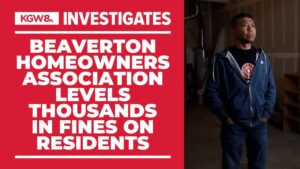In the tranquil suburban neighborhood of Beaverton, 33 families reside within the Cooper Mountain Estates HOA, enjoying the serenity of typical suburban life.
However, recent events have stirred up a storm of discontent among residents, particularly Sam Shaikh and his wife, who have called this neighborhood home since 2008.
Their decision to rent out their property to a retired military member and his family seemed harmless until new faces took the reins of the three-person HOA board last year.
Shaikh found himself at the center of a dispute with the HOA, facing mounting fines that now tally up to a staggering $10,150.
The root of the issue lies in the HOA’s power to enforce rules, collect dues, and levy penalties for infractions without the oversight typically associated with government agencies.
The situation quickly escalated when the board began targeting residents for seemingly trivial matters.
The conflict began when Shaikh’s tenant, an enthusiast of woodworking, received repeated violations and fines amounting to $1,350 per week.
The HOA board alleged that the tenant was running a woodworking business from the garage, exceeding the allowed space for vehicles, and using the garage for habitation – all deemed as violations of the HOA rules.
Despite Shaikh’s protests that the woodworking activities were merely a hobby and not a business endeavor, the fines continued to pile up.
Adding insult to injury, Shaikh and other families were penalized for having elderly relatives, such as parents-in-law, living with them.
The HOA imposed fines of $300 per week for what they deemed as multi-family dwellings, demanding personal details of all occupants, leading to feelings of humiliation and intrusion among the residents.
Some families opted to leave the neighborhood due to the oppressive fines and questionable decisions made by the board.
In a bold move to challenge the HOA board’s actions, a group of 12 homeowners penned a letter requesting a special meeting to vote on the removal of the board’s president.
However, their efforts were swiftly thwarted when the board hastily changed the bylaws, making it nearly impossible to call for a special meeting or challenge the board’s decisions.
The lack of transparency and accountability within the HOA governance left residents feeling powerless and disillusioned.
Despite attempts to seek clarification and resolution, including reaching out to the HOA president Martin Anderson for an interview, residents like Shaikh faced continued harassment and unwarranted fines.
The strain of battling the HOA’s arbitrary rulings took a toll on Shaikh and his tenants, eventually prompting them to seek refuge elsewhere due to the distress caused by the HOA’s relentless pursuit of penalties.
The lack of oversight and accountability within homeowners’ associations (HOAs) has raised concerns about the unchecked authority wielded by these private entities.
Legal expert Kevin Harker emphasized the challenges faced by residents in resolving disputes with HOAs, highlighting the prevalence of civil lawsuits as the final recourse for seeking justice.
As more new homeowners opt for HOA-governed properties, the need for greater transparency and resident involvement in HOA governance becomes increasingly vital.
In the face of mounting frustrations and injustices, residents like Shaikh are left grappling with a sense of betrayal and isolation within their own community.
The absence of regulatory mechanisms to address HOA grievances underscores the importance of vigilance and community engagement in safeguarding residents’ rights and interests.
As the debate over HOA accountability rages on, residents are urged to familiarize themselves with the bylaws, actively participate in HOA affairs, and seek legal counsel when navigating disputes with their HOA.
